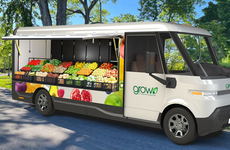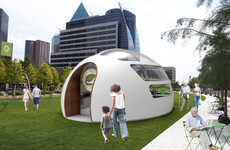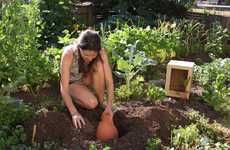
This Organic Garden Helps to Feed an Enitre Homeless Shelter
Katherine Pendrill — August 5, 2015 — Eco
References: atlantataskforceforhomeless.org & magazine.good.is
A homeless shelter in Atlanta recently opened an organic garden where homeless residents are encouraged to come and learn how to grow their own food. While organic food is largely associated with affluent consumers, the Metro Atlanta Task Force felt that all citizens should have access to healthy fruits and vegetables. Rather than relying on discounted snacks, the garden gives the residents an opportunity to eat the kinds of foods that may have previously been out of their reach.
The organic garden is located on the rooftop of the shelter and is maintained by the residents living there. The garden contains 80 beds, which grow everything from kale to squash. The freshly grown greens are used on site and help to provide the residents with full meals each day. Not only is the garden a source of food for the shelter, but it also helps the residents learn valuable gardening and marketing skills that may help them in finding future work.
The organic garden is located on the rooftop of the shelter and is maintained by the residents living there. The garden contains 80 beds, which grow everything from kale to squash. The freshly grown greens are used on site and help to provide the residents with full meals each day. Not only is the garden a source of food for the shelter, but it also helps the residents learn valuable gardening and marketing skills that may help them in finding future work.
Trend Themes
1. Homeless Garden Programs - Organic gardening programs for homeless populations provide opportunities for education, skill development, and access to healthy foods.
2. Community-supported Agriculture - Community-supported agriculture programs can bring fresh, organic produce to underserved communities, including homeless shelters.
3. Urban Agriculture - Rooftop and community gardens can provide sustainable food sources and education in urban areas.
Industry Implications
1. Nonprofit Organizations - Nonprofit organizations can create and support organic gardening programs for homeless populations in need.
2. Agriculture/farming - Healthy, sustainable, and accessible food production can be integrated into larger agriculture and farming industries.
3. Social Services - Homeless shelters and other social service programs can incorporate organic gardening as part of their services, providing nutrition and vocational training for clients.
1.2
Score
Popularity
Activity
Freshness























